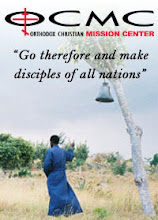"That's the smell of real Africa!” These were the words of a fellow passenger as we stepped off of the small plane. What struck me initially was not the smell, somewhat reminiscent of my grandparent's farm in rural Minnesota, but the completely exotic landscape. Lodwar is located in northeastern Kenya in what is basically a large desert with several small mountains, black and grave, in the distance.
But I was not here to survey the geography or admire the scenery. The purpose of our team was to teach. Surely God had been working among the hearts and minds of the Turkana since the beginning, but in 2007 Orthodoxy began to be part of their religious makeup and take root and grow. Today there are three native Turkana priests serving thirteen communities. In Lodwar the Liturgy is celebrated in a roofed building built with the help of the Orthodox Christian Mission Center, and in other places it is celebrated in the open air on whatever is available for the priest to set down an antiminsion.
On the evening that we arrived in Lodwar, we were immediately greeted with what felt like hundreds of children grasping for our hands and giving us hugs. Three members of our team, who had been to Lodwar previously, were greeted by old friends with joyous shouts and the rhythmic jumping that is characteristic of Turkana people. I had been on a Mission Team before, and had experienced the warmth and hospitality towards strangers that is somehow lacking in much of our modern Western society, but I was unprepared for just how authentically joyful the congregation was to see us.
The joy and excitement continued throughout the week. We began our day with Orthros, and the rest of the day was filled with lectures about the Orthodox faith and spiritual life and crafts. It was during this time that we realized that their joy and excitement to see us and share their lives with us was only matched by their enthusiasm to learn. At times when we would share stories from the Bible about God's immense love for us, they would clap and—literally--shout out for joy.
I felt that we were not only a teaching team but a learning team as well. During one of my lectures entitled “How God Works in the Church Today,” I asked the congregation to share how they have seen God work in their lives. As a Westerner, I was expecting that their experience would be much the same as my own—in times of doubt or trouble I turn to Scripture or the writings of the Saints and take comfort and advice from their words. What I heard was completely different—many stood up and shared how they had seen visions that told them to reform their lives or even come to the Orthodox Church. None had read their way into the faith, but instead had found solutions to their real problems through visions. Afterwards, when I spoke to one of the Turkana priests he told me that, due to illiteracy, there was not the same emphasis on the texts as in the West. This is just one small example of the complexity of the task of mission work among non-Western people.
After nearly two weeks of teaching, learning, worshipping, and sharing, it was time to leave. We departed—with singing, dancing, jumping, and shouting. Amidst smiles and tears, we were brought to the airport where I was able to catch the last smell of real Africa before the airplane would take me back to the routine life of my last year at seminary. The examples of love and service that I witnessed will follow me for the rest of my life and what I learned will guide and inspire my future ministry in the Church.
Subscribe to:
Post Comments (Atom)

No comments:
Post a Comment